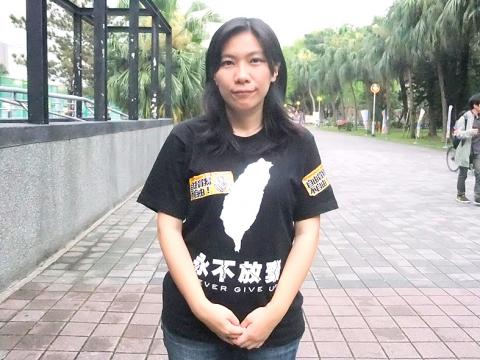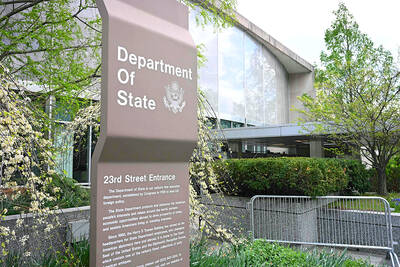The unprecedented occupation of the Legislative Yuan has thrust two young men, Lin Fei-fan (林飛帆) and Chen Wei-ting (陳為廷), into the media spotlight.
Yet the perceived success of the student movement against the controversial service trade agreement does not belong to them alone, but is also shared by many students who have made it their life mission to usher in changes to the nation. Chou Fu-i (周馥儀), a 33-year-old doctoral candidate at National Taiwan University’s Department of History, may seem no different from other students, but those familiar with the operation of the student movement would describe her as one of the heroines behind the scenes.
Referring to herself as a “cultural movement facilitator,” Chou is the chief coordinator of the Sunflower movement and was one of the hundreds of students that broke into and seized the legislature on March 18.

Photo: Taipei Times
Not appearing in front of cameras, does not make the weight of Chou’s role any lighter.
She is responsible for handling everything that happens both inside and outside the legislature, from organizing defensive tactics against gangsters attempting to attack anti-pact protesters to managing family members of political victims wanting to enter the legislature to express support to the student protesters in person.
Having taken part in the movements against the Kuokuang Petrochemical Technology Co’s proposed eighth naphtha cracker development project and the government’s forced appropriation of farmlands in Miaoli County’s Dapu Borough (大埔), Chou is arguably a veteran social activist.
She has endeavored to bring major social issues to the attention of the public, whether by teaming up with high-profile celebrities or resorting to the soft power of words, music and movies.
“I often ask myself: ‘What can I do to create a better social movement?’” Chou said.
That question prompted her to approach Taiwanese blockbuster filmmaker Wei Te-sheng (魏德聖) and ask for his approval to screen his latest work, Kano, at the legislature on Monday to lift the spirits of the protesters.
“The main idea of the movie is that people should never be afraid of failure. Most people are of the opinion that social movements can hardly make a difference, but I want to show them there is still hope to help them abandon such defeatism,” Chou said.
Chou has shed 5kg in weight over the past two weeks, with the fears of a possible police break-in and the pressure to play a helpful role in the movement.
“I only have to see people singing on the street to entertain protesters and students sitting in a circle outside the legislature discussing the trade agreement to feel alright again,” she said.
Chou said she had worried that the trade agreement might “blur” Taiwan’s artistic and cultural potential. However, the anti-pact movement has helped stimulate thinking, strengthen the nation’s cultural subjectivity and bring to the table the issue of national identity among young Taiwanese.
The movement has forced Taiwanese to confront and understand the taboo “China problem,” Chou said.
“It has also enabled young people to have a better understanding of politics and [the possible effects of] trade liberalization,” Chou said.
Chou said she was an otaku a Japanese term referring to people who stay at home all the time — who enjoyed cooking at home and that she only took to the street because it was the right thing to do.
“I just cannot look the other way when the country is suffering,” she said.

Hong Kong singer Eason Chan’s (陳奕迅) concerts in Kaohsiung this weekend have been postponed after he was diagnosed with Covid-19 this morning, the organizer said today. Chan’s “FEAR and DREAMS” concert which was scheduled to be held in the coming three days at the Kaohsiung Arena would be rescheduled to May 29, 30 and 31, while the three shows scheduled over the next weekend, from May 23 to 25, would be held as usual, Universal Music said in a statement. Ticket holders can apply for a full refund or attend the postponed concerts with the same seating, the organizer said. Refund arrangements would

Former president Tsai Ing-wen (蔡英文) on Monday called for greater cooperation between Taiwan, Lithuania and the EU to counter threats to information security, including attacks on undersea cables and other critical infrastructure. In a speech at Vilnius University in the Lithuanian capital, Tsai highlighted recent incidents in which vital undersea cables — essential for cross-border data transmission — were severed in the Taiwan Strait and the Baltic Sea over the past year. Taiwanese authorities suspect Chinese sabotage in the incidents near Taiwan’s waters, while EU leaders have said Russia is the likely culprit behind similar breaches in the Baltic. “Taiwan and our European

Taiwanese indie band Sunset Rollercoaster and South Korean outfit Hyukoh collectively received the most nominations at this year’s Golden Melody Awards, earning a total of seven nods from the jury on Wednesday. The bands collaborated on their 2024 album AAA, which received nominations for best band, best album producer, best album design and best vocal album recording. “Young Man,” a single from the album, earned nominations for song of the year and best music video, while another track, “Antenna,” also received a best music video nomination. Late Hong Kong-American singer Khalil Fong (方大同) was named the jury award winner for his 2024 album

The US Department of State on Monday reaffirmed that US policy on Taiwan remains unchanged, following US President Donald Trump’s use of the term “unification” while commenting on recent trade talks with China. Speaking at a wide-ranging press conference, Trump described what he viewed as progress in trade negotiations with China held in Geneva, Switzerland, over the weekend. “They’ve agreed to open China — fully open China, and I think it’s going to be fantastic for China. I think it’s going to be fantastic for us,” Trump said. “I think it’s going to be great for unification and peace.” Trump’s use of the